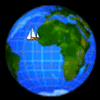Richard Konkolski - Knihy Konkolski s.r.o.
|
| DOMŮ |
|
|
FILMY-DVD | TELEVIZE | ROZHLAS | ČLÁNKY | SEDM MOŘÍ | SÓLO SAILING |
|
|
|
|
||
Era of Prince Henry of PortugalPrince Henry of Portugal From the Castle of Sagres near Cape St. Vincent, where, far from the court, he had fixed his residence in order to be less disturbed in his favourite studies, his eye glanced over the Atlantic, which constantly reminded him of the unknown lands which held out such brilliant prospects to the navigator who should venture to steer southwards along the African coast. The experienced seamen and learned geographers that surrounded him confirmed him in his hopes, and encouraged him to attempt the realisation of his generous ideas. At that time Portugal was full of the bold and enterprising spirit which the expulsion of the Moors and long native wars had called to life. The geographical position of the country, bounded on every side by the dominions of a mightier neighbour, forbade all extension by land, and pointed to the ocean as the only field in which a comparatively small but spirited people could hope to reap a rich harvest of wealth and glory. The first two ships which Prince Henry sent out on a voyage of discovery along the African coast in 1412 did not reach further than Cape Bojador. Cape's rocky cliffs, stretching far out into the Atlantic scared their inexperienced commanders. Discovery of Porto Santo and Madeira This led to a more important discovery. During landing on Porto Santo the attention of the Portuguese was struck by a black and noticeable spot, rising above the southern horizon. They directed their course to that spot, and soon they approached a large island. At that time the island was covered by dense forests up to the very top. They name the island of Madeira. Prince Henry immediately equipped a considerable fleet to carry a colony of his countrymen to the new land of promise. He had furnished his expedition with the wine of Cyprus, and the sugar-cane of Sicily, which raised so well on the Atlantic isle, that after a few years the produce of Madeira began to be of consequence in the trade of the mother country. The first undertakings of Prince Hanry were not left unrewarded. But besides the commercial advantages arising from the possession of Madeira, it encouraged the Portuguese navigators to no longer sail along the coasts, but boldly steer into the open sea. Doubling of Cape Bojador Discovery of the Cape Verde Islands It may easily be imagined how much these successes contributed to encourage the universal longing for discovery. Adventurers from all countries runned to Portugal. Even many Venetians and Genoese, who were at that time superior to all other nations in naval science, reckoned it as an honour to serve under a flag which might justly be considered as the high school of the seaman. Thus before Prince Henry closed his eyes in 1463 the aim of his glorious life had been achieved. True, he did not live to see his countrymen penetrate into the Indian Ocean, but he witnessed the mighty impulse which in a short time was to lead to that important result. Equator and Southern Hemisphere Under John the Second a mighty fleet discovered the kingdoms of Benin and Congo in 1484 and followed the coast 1500 miles beyond the equator, and revealed to Europe the constellations of another hemisphere. The farther their ships penetrated to the south, the higher rose their hopes. As the African continent bend towards the East as they proceeded, they no longer doubted that the way to the Indian Ocean would now soon be found, and give them the exclusive possession of a trade which had enriched Venice, and made that city the envy of the world. Bartholomew Diaz Vasco de Gama & Columbus Back to Maritime Discovery |
||||||||||||||||||||||||
|
||||||||||||||||||||||||


